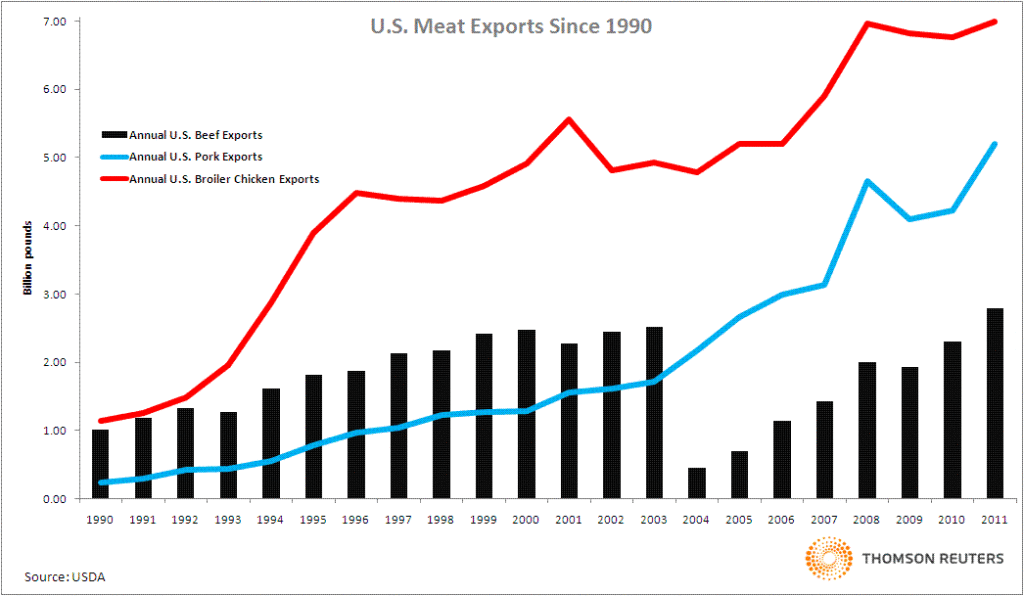As the New York Times reports today, “Three years ago, Ukraine filed an international legal challenge against Australia, over Australia’s right to enact antismoking laws on its own soil.”
What does an arcane lawsuit filed by one country against another country about tobacco have to do with animal advocacy here in the United States? Everything!
As the NYT goes on to report:
From Ukraine to Uruguay, Moldova to the Philippines, the U.S. Chamber of Commerce and its foreign affiliates have become the hammer for the tobacco industry, engaging in a worldwide effort to fight antismoking laws of all kinds.
How can this be? Because cigarettes are big business, and because capitalism doesn’t care who it hurts.
“Beef” and other animal products are even bigger business. And, despite our moderate success at promoting veganism at home and abroad, that business is booming. As consumption of animal products of all kinds continues to decline in the USA, exports will become even more important to the bottom line of animal-exploiting industries.

U.S. “meat” exports, 1990-2011. (The dip in “beef” exports starting in 2004 was during the “mad cow disease” scare.)
That means that we will continue to see what we have already begun to see: animal exploiters taking pages from the tobacco industry playbook. Like Big Tobacco, Big Beef and other “meat” producers will leverage both economic and political power to muscle into new markets and resist any regulation. At the same time, just like Big Tobacco, Big Dairy and other vendors of animal products will clamor for “consumer choice” and against “government interference” while using sophisticated marketing strategies to trick people into craving things that are bad for them.
Make no mistake: Lobbyists for the tobacco industry have been and continue to be utterly ruthless and amoral in their quest for profits from a product that kills people. Do you imagine that lobbyists for the inherently ruthless and amoral practice of exploiting animals for profit will be any less determined to preserve their privileges?
It’s actually worse when it comes to meat, dairy, and eggs: There, it’s not only corporations and trade associations but also the government itself that tries to bully other countries into buying.
And that means that, even if we were as successful at getting people to quit meat (and dairy and eggs and etc) as public health campaigners have been at getting people to quit smoking, it wouldn’t be enough.
What else can we do? What can you do?
Nationally and internationally, animal advocates must be part of the struggle to stop multinational corporations from using trade deals to circumvent environmental, consumer protection, and other regulations. For organizations that work within the system, that might mean saving some lobbying clout for the subject of international trade.
For more grassroots groups, that might mean joining forces with antiglobalization activists in order to ensure that animal interests are represented in their protest activities. Anything we can do to help people maintain the right to say “no” to particular products and to protect the natural environment is going to be helpful, in the long run, to nonhuman animals. (We also need to make sure that animal interests aren’t neglected by the people struggling for economic and environmental justice, and the best way to do that is to become some of the people struggling for economic and environmental justice.)
But all of that’s just stop-gap. So long as so many farmers depend for their livelihoods on animal agriculture, they will call upon the government and trade associations to vigorously promote their products abroad. Creating a market for alternative food products, as all of we vegans do, is part of the solution to that conundrum, but only part.
It’s not a simple matter, not at all, for a farmer to transition from animal exploitation to crop-based agriculture. The farmer may not know anything at all about growing the crops that would be more profitable than continuing to exploit animals. All available capital may have been sunk into buildings and equipment with very specific purposes.
Here in Vermont, for example, there’s a milk glut right now. But a third-generation dairy farmer isn’t going to have the skills or the capital to suddenly shift to growing crops instead. What that farmer will do, what those farmers are doing, is call upon the powers-that-be to help them sell more milk.
Here, there, and everywhere are small veganic projects that could be scaled upward in ways that enrich rural communities. Here, there, and everywhere are frustrated farmers who might seize opportunities. Animals might be well served if some of the funds now devoted to endless iterations of the “go vegan” message and all of the funds and energy now devoted to spurious “humane” reforms of animal agriculture were devoted instead to helping farmers get out of the business of exploiting animals.
So, what can we learn from Big Tobacco? That powerful industries will make more customers, even if it kills people to do so. That should focus our attention on the folly of appealing only to customers when trying to end animal farming. Let’s pay attention to supply as well as demand by giving farmers and the rural communities they support something more satisfying to do than exploit animals.




The trade deal called Trans-Pacific Partnership (TPP) will be able to subvert and undermine a nation’s laws and a people’s will (and health and happiness).
Speaking of equipping farmers to switch from using animals to growing produce veganically, Harold Brown, a former beef farmer, founded Farm Kind (www.farmkind.org) a few years ago to help them do just that!
I see he’ll be speaking at the North American Vegetarian Summerfest July 8th-12th (www.vegetariansummerfest.org)